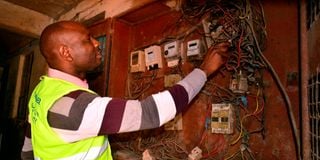Can’t pay, won’t pay: Kenyans fail to pay Sh27bn electricity bills

A Kenya Power employee inspects a meter box at an apartment building in Tassia Estate, Nairobi in February 2020.
Kenyans owe Kenya Power Sh27.3 billion worth of electricity that they consumed in the financial year to June 2022 without paying for it, exposing the utility company to financial difficulties.
Most of this debt had not been paid for more than three months heading to June by heavy consumers such as county governments, ministries, departments and agencies, parastatals, industrial customers as well as household users especially those fitted with postpaid meters.
Some Sh14.3 billion of the debt was outstanding for more than three months, Sh2.11 billion stood unpaid for between 30 days and 90 days and Sh10.7 billion was due for less than 30 days.
Kenya Power has now written off Sh14.9 billion of the total outstanding debt, which means that, while customers paying it will be a welcome boost to its finances, the company does not expect to manage to recover that debt.
Of the outstanding debt, 60 per cent is owed by domestic customers, 30 per cent by small and medium-sized enterprises (SMEs), and 10 per cent by big customers.
However, these numbers mark an improvement from the previous financial year, where Kenya Power’s outstanding debt from its customers hit Sh29.6 billion in the financial year 2020/21 with the company writing off Sh15.8 billion.
Unpaid power bills have been a headache for the utility firm for decades, but the problem has been accelerated in recent years amid high electricity costs and a sharp rise in the cost of living.
This has affected the utility’s working capital and pushed it into liquidity challenges, forcing the company to rely on overdrafts and commercial loans to settle its financial obligations.
For instance, Kenya Power had a negative working capital of Sh55.7 billion in June, even if it was an improvement of Sh10.7 billion from a negative working capital of Sh66.4 billion in the previous fiscal year.
The National Treasury this year promised to push county governments and government entities to settle their power bills in a bid to support the turnaround of the utility company whose financial woes have seen it survive on State bailouts. Kenya Power is betting on government support to recover billions of shillings from public sector debtors to supplement other efforts it has rolled out to recover the unpaid electricity bills from its customers.
Kenya Power also relies on private debt collectors, who are paid a commission, to go after defaulters. In July, the company sought four private debt collectors to go after 98,972 defaulters who had not paid some Sh1.29 billion in electricity bills for six months.
The highest number of defaulters were in the Central Rift Valley region (37,996) owing the company Sh318 million, while 32,992 customers in Western owed Sh409 million. In the North Rift, 15,960 clients owed Sh339 million, while 12,024 in South Nyanza defaulted on Sh227 million.
Last year, the company hired four firms to help it recover Sh2.3 billion. Kenya Power is also betting on connecting more of its customers to prepaid meters to help cut debt accumulation.
The company has some 8.9 million households connected to the grid, including 6.8 million that are fitted with prepaid meters and 2.1 million on post-paid meters. The company this year went back to the market to procure some 5,000 new smart meters to replace its old ones that are prone to tampering, denying it revenue through unpaid bills.





